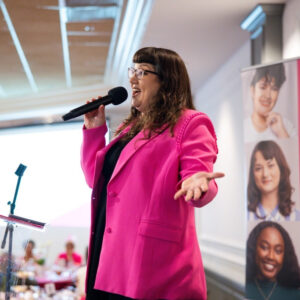Florida schools offer minimal, abstinence-focused sex ed. Community programs work to fill in the gaps.
By Dania Hefley
Original Air Date: September 12, 2025
Host: Sexually transmitted diseases are rebounding among young people in the state. To understand the troubling trend, Dania Hefley spoke with a community health educator.
Dania Hefley: Rates of chlamydia, gonorrhea and syphilis among Florida teens are at their highest since 2008. State health data from 2023 show more than 15,000 cases of chlamydia and about 4,200 cases of gonorrhea among 13- to 17-year-olds.
The numbers reveal sharp racial disparities. Black non-Hispanic teens face a chlamydia rate more than four times higher than white non-Hispanic teens.
To learn more about this troubling trend, we spoke with Kira Lynn Ferderber, a Community Health Educator with Planned Parenthood of Florida. We asked her about the state of sex education in Florida schools.

Kyra Lynn Ferderber
Kira Lynn Ferderber: Young people in Florida are generally not getting any sex ed at all. That’s very common. For students who are getting some sex ed in the school, it’s rare for it to be detailed, extensive and of a high quality. Young people are generally making uninformed decisions unless they get that information elsewhere outside of health classes in school.
DH: The state’s response has been to promote health curricula that focus on abstinence. In Sarasota public schools, the curriculum includes a required course called Health Opportunities through Physical Education, or HOPE. This curriculum teaches students about teen dating violence, puberty and the consequences of teenage pregnancy but is not required to be medically accurate.
Florida law mandates that public schools must teach a comprehensive health education that includes giving “students in grades six through 12 an awareness of the benefits of sexual abstinence as the expected standard and the consequences of teenage pregnancy.”
Ferderber went on to explain the public health concerns associated with the state’s abstinence-only curriculum, an approach that is politically popular but has been criticized by health advocates as unscientific.
 KLF: What we know is that abstinence-only curricula doesn’t really change the likelihood that young people will engage in some sexual activity in high school. Abstinence-focused approaches to teaching sex ed are successful in reducing rates of condom use, birth control use. They also relay a lot of shame to young people. They make it difficult for them to reach out for help if they get into a health situation where they need support.
KLF: What we know is that abstinence-only curricula doesn’t really change the likelihood that young people will engage in some sexual activity in high school. Abstinence-focused approaches to teaching sex ed are successful in reducing rates of condom use, birth control use. They also relay a lot of shame to young people. They make it difficult for them to reach out for help if they get into a health situation where they need support.
DH: She also discussed the issue of consent, noting the high rates of sexual violence in the state. Florida’s education standards do not require instruction on consent, and some recent state directives have removed consent from approved curriculum materials. Ferderber noted that sexual violence is an issue affecting youth at high rates across the state.
KLF: Unfortunately, sexual violence—intimate partner violence—is something that affects people all across Florida, all across the world. We know that about one in three girls and about one in six boys may experience some kind of sexual exploitation. Not talking about consent doesn’t make the issue go away.
DH: She also talked about how these policies are affecting LGBTQ+ youth.
KLF: We see Florida policy leaving LGBTQ youth behind, leaving their families behind. Abstinence-only education really doesn’t speak to the needs of almost any of the students that are receiving it. These messages focused on virginity, heterosexual marriage and a very limited view of the world are irrelevant to young people, and that leaves them even more vulnerable to physical and mental health issues.
DH: Planned Parenthood’s educational programs are working to address these gaps.
Ferderber explains that their programs are effective because their strategy focuses on providing medically accurate, age appropriate information and encouraging family-based education where parents are the primary source.
“Time for Your Teen” is a program that helps parents and caregivers discuss sexual health and values with young people. They also have peer education programs where students become ambassadors to share resources with their friends.
She gave details about their peer education program.
KLF: Planned Parenthood of Florida also offers an excellent peer education program where we work with young people at the high school and college level to provide them with excellent comprehensive sex ed. Then we ask those students to be an ambassador in their school and share sexual health information and resources with their peers because we know peers really respond well to hearing about these messages from people close to their own age.
DH: Ferderber explained how they make their programs accessible.
KLF: All of Planned Parenthood’s community education programs are provided at no cost. They can be provided in person, but they can also be provided virtually. We’re happy to provide information to small or large groups online. We also offer regular webinars that you can sign up for on our website or follow us on social media on all kinds of topics.
DH: Ferderber shared a final message for parents.
KLF: I know that talking to young people about sex and sexuality can be really intimidating. My message for parents and for families out there is that you don’t have to do it alone. At Planned Parenthood, on our website, through our sexual health education classes, we are here to support you as you talk to the young person in your life about some of these tricky questions because we have heard it all.
DH: This is Dania Hefley, reporting for WSLR News.
WSLR News aims to keep the local community informed with our 1/2 hour local news show, quarterly newspaper and social media feeds. The local news broadcast airs on Wednesdays and Fridays at 6pm.